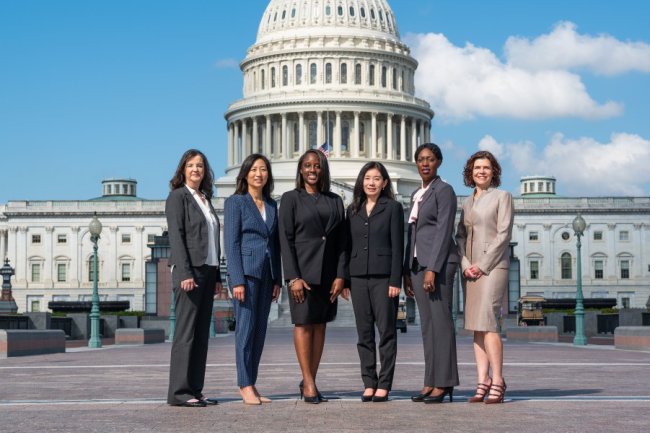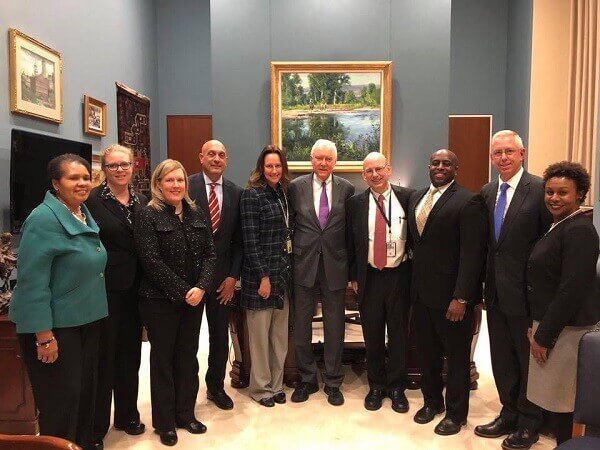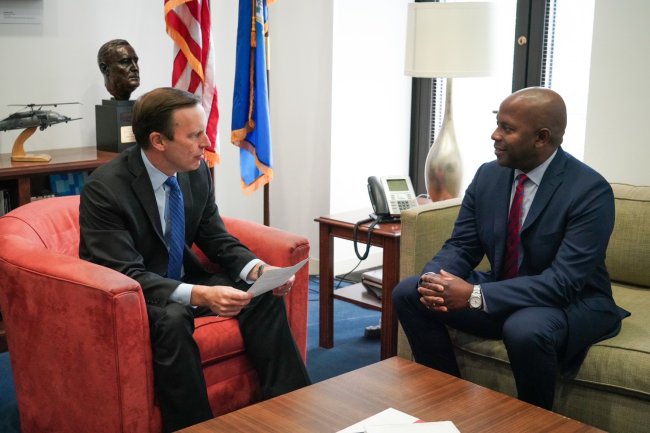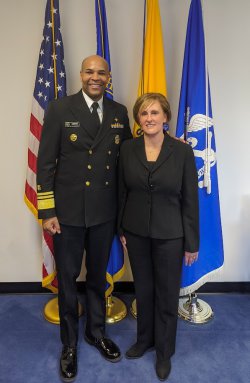The RWJF Health Policy Fellows Program Offers Insider Access to Life on Capitol Hill

The RWJF Health Policy Fellows Class of 2022-2023 pose in front of the U.S. Capitol Building
By Marisa Coulton
When it comes to the world of federal health policy, there is nothing that compares to being there, in the room where it happens.
“Working in Congress is really something that you can only understand being right in it,” said Ann Sheehy, class of 2021-2022 RWJF Health Policy Fellow, right after she wrapped up her placement in the House of Representatives. “I felt like no amount of reading books or taking courses would give me that sense.”
Every year, the Robert Wood Johnson Foundation (RWJF) Health Policy Fellows program selects six exceptional midcareer professionals to leave their positions for a year and move to Washington, DC. They take on 9-month placements in Capitol Hill—a world as fascinating as it is confusing. But the fellowship is the fastest and most efficient way to understand the complex inner workings of “The Hill.” Few programs offer such insider access.
“You just don’t know what you don’t know until you’re in it,” said Sheehy.
The health policy fellows prepare for their placements through an intensive three-and-a-half-month orientation, where they meet a “who’s who” of American health policy leaders and organizations. Then, the fellows attend a series of group meetings where they explore possible placements. Finally, the fellows have one-on-one interviews with the offices they are most interested in. These can include congressional placements in the House of Representatives or the Senate, or in the Executive Branch.
During their placements, fellows apply their experience and expertise to help develop strategy and policy proposals, draft legislative language, meet with constituents, brief legislators and senior officials on health issues, and provide staff support for hearings and speeches. But the work can change depending on the day. As the fellows come to learn, Hill staffers are “renaissance people,” capable of taking on any and all tasks as they come up, even if they might be outside their area of expertise.
It’s a different kind of work than the fellows might be used to. Joe Antos, a senior fellow and scholar at the American Enterprise Institute who previously served on the fellowship’s selection committee, said the fellows often get a shock when they arrive on the Hill in January. “You can’t even describe it to people. It’s a peculiar experience for everybody,” he said. “Nobody really knows until they go there, what their role (will) be (like), working for a committee on the Hill.”
Kristin Ashford, class of 2021-2022, agrees. During her placement at the House Committee on Energy and Commerce, each day was a new adventure. “It seemed like every day I would come to work, I would learn ten new terms, ten new acronyms,” she said.
Learning the layout of the Capitol was a challenge in and of itself. “It took some time, but it was fun,” Ashford added. “It was a time of immense learning.”
RWJF Health Policy Fellows are always open to a challenge. Class of 2019-2020 fellow Sharron Crowder deliberately selected a placement that would enable her to enhance her skills as a nursing leader, a teaching expert, and a leader in professional organizations.
“What was I going to engage in, (during) my fellowship, that was going to transform my leadership opportunities?” she asked herself at the time. She ultimately landed in the U.S. House Committee on Education and Labor, on the health policy team.
Crowder came to work every day ready and eager to learn. “It was a phenomenal, eye-opening experience,” she said. The placement enabled her to view health policy through a different lens, observing the critical issues and how committees chose to address them through hearings and markups.
“A Weird World Unto Itself”
The fellows are often far outside their comfort zone during their placement, but this sets the stage for life-changing learning experiences.
Years of operating at the top of one’s field can give even the most open-minded clinician tunnel vision. Prior to the fellowship, fellows often describe feeling “focused” or even “siloed.” They describe the RWJF Health Policy Fellows program as exactly the sort of push they need to take the next step, in order to reach their full potential. The program “activate(s) some neurons and some of those latent ambitions that we all have. It motivate(s) them to see what else there is,” said Antos.
“Policy work can be very challenging. It can be very difficult to manage multiple legitimate, yet competing interests to find a path forward.”
But learning a whole new system midway through one’s career can be jarring. “As senior as they may be in their normal lives, they’re not very senior up on the Hill,” Antos added. The fellows often need to go back to basics when they start their placements. Antos recommends that they keep an open mind throughout the process. “The key to the success of any individual in this program when they go up on the Hill is a willingness to take on any assignment that’s given, and also not be afraid to speak up,” said Antos.
The placement is challenging partly because of the nature of the Hill itself. “The job changes depending on the placement, depending on the issues that are in play, depending on whether it’s an election year or not,” Antos said. The fellows are “used to coming into a more structured setting, where they know what the job is before they take it,” he said. “It’s a real eye opener for the fellows.”
Frederick Isasi, executive director of Families USA and a mentor to the fellows, echoed this sentiment. “Everyone is surprised, because the Hill is such a weird world unto itself,” he said. “The policy levers on the national level are so blunt and so broad… There’s very little nuance in there.”
During their placements, fellows learn to translate their specific areas of expertise into high-level federal policy. They also learn the art of negotiation. “Policy work can be very challenging. It can be very difficult to manage multiple legitimate, yet competing interests to find a path forward,” said fellowship program director Gregg Margolis, who was a fellow himself in 2009-2010. Policy gains are often made incrementally, he added, but even a small policy win at the federal level can have an enormous ripple effect.
But the RWJF Health Policy Fellows needn’t wait too long to have an impact. Most Hill staffers climb the ranks for years before they have the opportunity to influence health policy in a meaningful way. The program allows fellows to skip this process and enter directly into the world of lawmaking.
“If you want to impact a policy that’s being written into law… the fellowship lets (you) kind of run right into that space, which is really exciting,” said Isasi.

Alumni and Members of the Class of 2018-2019 meet with Senator Orrin Hatch
“The Room Where It Happens”
What the fellows lack in Hill experience, they more than make up for with their decades of clinical and other hands-on expertise. The placements facilitate a rich academic exchange between the government offices and the fellows, who “provide a real benefit to the committees because they understand important aspects of clinical care,” said Antos.
With their years of real-world experience, the fellows have been “in the room where it happens,” and have a wealth of insights to share. Fellows with clinical backgrounds have a strong understanding of the challenges faced by both clinicians and patients, said Sheila Burke, former congressional staffer, who meets with the fellows during their orientation.
First-hand experience in health care is absolutely critical when it comes to policy making, said Georges Benjamin, physician and executive director of the American Public Health Association (APHA). “What you’re doing is not theoretical. You’re bringing your clinical experience, what you’ve seen happen to your patients, how policy has impacted your patients. (You see) very differently than a non-clinician,” said Benjamin, who regularly advises the fellows. The placement enables fellows to “bridge” the clinical and policy worlds, and “orient themselves differently to the practice of health and health policy,” he explained.
Mary Moody, health policy director to Senator Bill Cassidy, likes having the fellows on hand to consult when important medical questions arise. It’s faster and easier than touching base with an advisor outside the team, she said.
It helps streamline operations for Moody, whose primary job is to advise Senator Cassidy on health policy matters. Brenda Baker, class of 2021-2022, contributed her on-the-ground experience as a nurse to help Cassidy’s office develop policy solutions for the nursing shortage.
“It’s been great, she’s fantastic,” said Moody. “When you have someone as competent and professional as she is, it makes for a good experience. And she’s definitely added value to our office, and provided really helpful insight.”
“What you’re doing is not theoretical. You’re bringing your clinical experience.”
Moody appreciates the structure of the RWJF Health Policy Fellows program, namely the fact that the fellows are midcareer professionals with experience under their belts. “I think that is very helpful for people like me… I’ve never been a nurse. I’ve never been a psychiatrist,” said Moody. “Bringing in someone with real, on-the-ground experience and having them as a person to bounce ideas off of and work things through with is really helpful.”
The knowledge exchange is not a one-way street, by any means. Moody’s approach is to involve fellows as much as possible in the day-to-day work of the office. “We try to create an environment where it is mutually meaningful and beneficial for them and for us,” she said. For example, Baker and Moody recently met to discuss a nursing shortage paper Baker had written, which included policy recommendations and possible solutions.
Moody likens the RWJF Health Policy Fellows program to a “well-oiled machine.” Because of this, the program has no trouble recruiting top-notch people, she said. “The fellows we’ve had have provided value, they’ve contributed to our office… Every interaction I’ve had with an RWJF fellow has been positive.”
Witnessing History
The RWJF Health Policy Fellows program turns fellows into instant Hill insiders. This means that they often get to witness the passage of landmark legislation.
“I was fortunate to be a fellow during the year of the passage of the Affordable Care Act,” said Margolis. “I was there for history… Pretty heady stuff,” he said.
“I go to work every day with people who are just committed to public service. They’re trying to make the country better. They may not all agree on how that should be done, but for the most part, I would not know if they were Republican or Democrat if you did not tell me.”
Crowder was a fellow during the COVID-19 pandemic, an unprecedented moment in the history of U.S. health policy. During her placement, she helped facilitate the shift to telehealth. “I was looking at telehealth from the perspective of coverage for private insurance, as well as being aware of what kind of coverage was being done through Medicare and Medicaid,” she said. “We changed our whole way of structuring and providing health care… My team was a part of that whole pivoting.”
She also contributed research to the congressional record, which would ultimately become law.
Though she had served on a number of national committees and engaged with congressional offices in the past, her fellowship placement was different, said Crowder, because it showed her the “real world” of Capitol Hill. “This was the first time I had been on the inside… of how policy works, of how the sausage is made,” she said. What’s more, “being on the committee opened doors to opportunities I had never had before.”
Crowder recalls feeling a sense of wonder as she walked to work each day through the National Statuary Hall, a chamber in the Capitol devoted to sculptures of prominent Americans. She remembers thinking, awestruck: “This is my day-to-day.” She had the feeling, then, of being part of something greater than herself. She had the same feeling every time she worked on legislation only to see it pop up on television news a few days later.
Being on the inside enabled her to have a real, tangible impact on the lives of everyday Americans, she realized.
Brian Williams, class of 2021-2022, learned that what he saw on television was just a small part of what was really going on at Capitol Hill. “Behind the scenes, you really don’t see the sort of rancor that you expect when watching the news,” he said. Working on the Hill, he observed a sense of cooperation and commitment across party lines that is difficult to describe. You have to see it to believe it, he said.
“I go to work every day with people who are just committed to public service,” Williams said. “They’re trying to make the country better. They may not all agree on how that should be done, but for the most part, I would not know if they were Republican or Democrat if you did not tell me.” Regardless of political affiliation, the staffers on the Hill are wholeheartedly committed to the issues affecting Americans, he said. “That is absolutely inspiring to see that first-hand,” said Williams. “I wish more people in the country got to see what I see every day.”
Sheehy, a member of Williams’ fellowship cohort, agreed. “If you watch the news, it’s easy to get cynical, it’s easy to get down, it’s easy to focus on the things that have gone wrong. That may be more interesting news, things that are controversial,” she said.
“The bulk of what we see here is the non-controversial stuff. People really working and making progress, and responding to the needs of patients and health care in general. That’s the day-to-day,” she added. “You see the hard work that’s put in to make those things happen. It’s hard to have that perspective without having been here.”
Beyond the Placement
At the end of their placements, the RWJF Health Policy Fellows complete a formal, capstone presentation on a key health policy issue that they tackled during their placement. But the experience doesn’t always end there. Fellows have the option to extend their residency in Washington, DC, beyond the initial 12-month period. That is what Williams did. He wanted to get the most out of the program that he possibly could.
Williams, a trauma surgeon who first worked in the office of Senator Chris Murphy, said that this placement was the “perfect” place to be, given that both Williams and Murphy have an interest in gun safety. An alignment of interests is common across most placements, given that fellows have complete freedom in choosing their supervisors.
After his initial placement concluded, Williams went to work with Wendell Primus, Senior Policy Advisor on Budget and Health Issues to Speaker Nancy Pelosi. Primus, who frequently hosts RWJF Health Policy Fellows, said he appreciates the fellows’ support because it lightens his load. “They help out immensely,” he said. “They help relieve me. I have a very broad portfolio.”
“They really believe in what they’re doing, in making health policy better for Americans. It’s that simple.”
Primus is responsible for coordinating the office’s health staff, developing legislation, and guiding that legislation through to passage. On top of this, Primus meets 3 to 5 times per day with outside interest groups in order to understand their perspective. RWJF Health Policy Fellows often sit in on these meetings.
Primus has worked with the fellowship program for two decades. He likes to give his fellows ample freedom and flexibility, he said, and they always seem to rise to the challenge. “They’re all very bright, smart.”
Sheehy, who also worked with Primus, helped the office get “some important health legislation across the finish line,” Primus said, “including the Inflation Reduction Act.” Her medical knowledge was especially helpful to him, he added, because he is an economist by training, not a clinician.
Sheehy enjoyed the experience just as much as Primus. “I have a greater appreciation for the decisions that shape the policy realm, that impact health care. I have a sense of the real, true dedication of the people in Washington that are trying to make things better for our patients all the time,” she said.
“It’s actually really inspiring,” she said. “It’s been wonderful. I’ve learned so much. I’m inspired by the people who are working here and are so dedicated, who work long hours, hard hours, really, for no personal glory of their own.” The Hill staffers conduct their work with authenticity, Sheehy noted, which makes it all the more powerful to witness. “They really believe in what they’re doing, in making health policy better for Americans. It’s that simple.”
A Sprawling Alumni Network
The benefits of the RWJF Health Policy Fellows program continue long after the fellows conclude their placements on the Hill.
The fellowship inspired Crowder to take new directions in her career at the Indiana University School of Nursing, where she works as a clinical associate professor. “It changed my personal as well as my professional trajectory, being in the fellowship and the placement,” she said.
“ I have a greater appreciation for the decisions that shape the policy realm, that impact health care. I have a sense of the real, true dedication of the people in Washington that are trying to make things better for our patients all the time.”
“My fellowship, including my placement, greatly informed the programs that we have at IU school of nursing,” Crowder said. When she returned to the university after her fellowship, she made a concerted effort to incorporate health policy into her teaching. “I came back and I changed all of my courses. My health policy course, I elevated. I integrated more policy analysis.”
Her students now analyze hearings and look at the evidence-based decision making involved in the legislative process. The fellowship placement also encouraged her to develop a specialty legislative program for students—a RWJF Health Policy Fellows program in miniature.
Crowder remains connected to the program through her involvement in the alumni network. “The unique aspect of this fellowship is that they keep the alumni together. We have alumni events, we have meetings… we meet annually, every year in October,” she said. At events such as the Alumni Retreat and the National Academy of Medicine (NAM) Annual Meeting in Washington, former fellows discuss the impact the fellowship has had for them personally and professionally. (The RWJF Health Policy Fellows program is administered by the NAM with funding support from the Robert Wood Johnson Foundation.)
RWJF Health Policy Fellows alumni can be found in high-ranking roles across the country. As members of the alumni network, fellows remain insiders in the complex, yet gratifying world of American health policy.
Her congressional fellowship placement was a challenge, for sure, but Crowder would do it all again if she had the chance. “Would I say that it was worth it?” she asked. “Without a doubt!”
Become an insider. Apply for the Robert Wood Johnson Foundation Health Policy Fellows Program today!
Applications for the 2023-2024 class of RWJF Health Policy Fellows are open September 8 through November 7, 2022. Learn more at HealthPolicyFellows.org
Follow the RWJF Health Policy Fellows program on LinkedIn or email info@healthpolicyfellows.org to get in touch.
About the Author: Marisa Coulton is a journalist based in Montreal, Canada. She holds a Master of Journalism and a Master of International Affairs from Columbia University.



